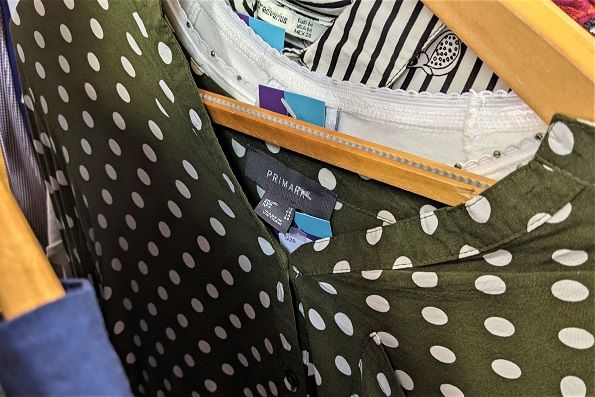Article - People In Primark Queues Aren't Your Enemy
'Fast fashion' must be critiqued as a corporate drive for profit not as the fault of the working classes

This week my social media timelines filled with rage at people who had gone shopping at Primark. But the people in those queues are not the enemy.
Back in the Summer of 2020, lockdown had just eased and temperatures were rising. When Primark reopened, it sparked a wave of condemnation of people who had queued up to shop. Some posts were blaming Primark shoppers for climate change and factory conditions, some said they should save their money and buy something they ‘really wanted,’ others said people in the queues were automatically racist for buying fast-fashion, others that people should shop second hand – seemingly forgetting that when charity shops eventually open at least half of what they sell these days is Primark or its competitors. On and on it went with photographs of these queues adding to the sense that ‘those people’ should feel shame.
There is clearly a lot to unpick here and it saddens me that fashion’s ‘movement for change’ still seems to lack a basic grounding in the structural issues that make the fashion industry so exploitative of people and planet. In the fashion industry, there are four key elements of exploitation that are inextricably linked – fashion would not exist without the exploitation of 1) women 2) people of colour 3) the global working class 4) the planet (the biosphere and animals). Any action, any post, any campaign must have these four things at its heart. Otherwise it does more harm than good.
Here are my thoughts on the third issue – the impact of the fashion industry on the global working class and why people in Primark are not the enemy.
Fashion is a false emancipation that is disastrous for the global working class. It is the working class that are held captive in sweatshops, have their unions smashed, and their homes flooded or turned to dust by climate change. It is the working class that end up wearing poor quality clothes that easily wear out and are quickly scorned as unfashionable. It is the working class that are forced by low wages and the homogenisation of high streets into shopping or working in shops like Primark.
It is also the working class that are driven to anxiety and a sense of inadequacy for not being able to keep up with fashion. Before she died, feminist academic Sandra Lee Bartky wrote extremely powerfully on the burden of double shame borne by some women – the shame of poverty coupled with the shame of being unable to keep up with fashion.
But fashion should not just be seen as a psychological burden. The ability to conform to accepted standards of dress & appearance is critical for social mobility. This was vital to understand in the 2008 financial crash (Vogue: "It's okay to be redundant, but not to look redundant.") And it must not be forgotten now. Only this week Professor Prem Sikka at Essex University tweeted that: 'Tory austerity destroyed wages, household debt is £1,680bn, 12.8m households have no savings or less than £1,500.' To pretend that everyone in the UK has the same shopping options – or any ability to save for something they ‘really want’ - is tone deaf to reality.
So while fashion is not pro-working class, it MUST be critiqued as a product of corporations drive for profit NOT as the fault of the working classes. To live on earth everyone’s shopping habits must change – please note that I am not talking here about ‘fast-fashion.’ Post lockdown, customers spent US $2.7 million at the Hermes flagship store in Guangzhou - believed to be the highest ever daily takings for a luxury boutique in China. Why do we not encounter the same photos, posts, and hand-wringing for luxury stores opening?
There is no truth in the assertion that shopping for expensive clothes is better, or that wealthy 'good' shoppers have smaller carbon footprints. Rich people in the USA create more carbon driving their car than an entire household of poorer people do in 8 months.
But even if everyone on the planet reduced the emissions from their lifestyles right down to a minimum baseline, it still would not solve climate change. For that we need to deal with the corporations who make more emissions than the rest of us put together: Fashion, like climate change is not an individual issue.
To understand why things are in such a mess we must recognise that the past thirty years have seen a meteoric rise in corporate power, a rise which has been matched by two interlinked issues:
a) A massive lack of corporate regulation
b) The dominance of an ideology that states that *actually consumers are in charge* - ‘consumer is king’
It is no coincidence that we have been steered into this way of thinking, and with fashion it is particularly seductive given the personal nature of clothes, but the 'Consumer is king' argument is neoliberal nonsense that belongs in the dustbin of history. There is no democracy in fashion nor any way to shop/not shop ourselves out of exploitation.
Neoliberalism teaches us that empowerment comes from acting individually rather than collectively, and that we should trust in the system and shop, rather than fight our way to a new world. This is why people are still trapped in sweatshops and the world is on fire. There are major corporate powers to be investigated, interrupted, and dismantled. The people in those Primark queues - no matter what brings them there - are not your enemy.
Originally published on social media and then as an OpEd for Fashion Roundtable
